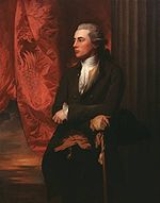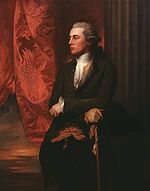
Proctor-Beauchamp Baronets
Encyclopedia

Member of Parliament
A Member of Parliament is a representative of the voters to a :parliament. In many countries with bicameral parliaments, the term applies specifically to members of the lower house, as upper houses often have a different title, such as senate, and thus also have different titles for its members,...
for Middlesex
Middlesex (UK Parliament constituency)
Middlesex is a former United Kingdom Parliamentary constituency. It was a constituency of the House of Commons of the Parliament of England then of the Parliament of Great Britain from 1707 to 1800 and of the Parliament of the United Kingdom from 1801 to 1885....
. Born William Beauchamp, he assumed the additional surname of Proctor according to the will of his maternal uncle, George Proctor, of Langley Park
Langley Hall
Langley Hall is a red-brick building in the Palladian style, located in Loddon, Norfolk. It was built in 1737 for Richard Berney, on land that until the Dissolution of the Monasteries belonged to Langley Abbey, and sold two years later to George Proctor to enable Berney to repay his debts...
, Norfolk
Norfolk
Norfolk is a low-lying county in the East of England. It has borders with Lincolnshire to the west, Cambridgeshire to the west and southwest and Suffolk to the south. Its northern and eastern boundaries are the North Sea coast and to the north-west the county is bordered by The Wash. The county...
. The third Baronet was an Admiral
Admiral
Admiral is the rank, or part of the name of the ranks, of the highest naval officers. It is usually considered a full admiral and above vice admiral and below admiral of the fleet . It is usually abbreviated to "Adm" or "ADM"...
in the Royal Navy
Royal Navy
The Royal Navy is the naval warfare service branch of the British Armed Forces. Founded in the 16th century, it is the oldest service branch and is known as the Senior Service...
. The fourth Baronet assumed by Royal license the surname of Proctor-Beauchamp in lieu of Beauchamp-Proctor in 1852 and served as High Sheriff of Norfolk
High Sheriff of Norfolk
This is a list of High Sheriffs of Norfolk. The High Sheriff is the oldest secular office under the Crown and is appointed annually by the Crown. He was originally the principal law enforcement officer in the county and presided at the Assizes and other important county meetings...
in 1869.. The sixth Baronet was a Colonel
Colonel
Colonel , abbreviated Col or COL, is a military rank of a senior commissioned officer. It or a corresponding rank exists in most armies and in many air forces; the naval equivalent rank is generally "Captain". It is also used in some police forces and other paramilitary rank structures...
in the Norfolk Regiment and was killed in action in the First World War. The seventh Baronet was a missionary in China
China
Chinese civilization may refer to:* China for more general discussion of the country.* Chinese culture* Greater China, the transnational community of ethnic Chinese.* History of China* Sinosphere, the area historically affected by Chinese culture...
and one of the Cambridge Seven
Cambridge Seven
The Cambridge Seven were seven students from Cambridge University, who in 1885, decided to become missionaries in China; the seven were:*Charles Thomas Studd*Montagu Harry Proctor Beauchamp*Stanley P. Smith*Arthur T. Polhill-Turner*Dixon Edward Hoste...
.
Two other members of the family may also be mentioned. Edward Beauchamp, second son of Reverend William Henry Beauchamp, second son of the third Baronet, was a Liberal
Liberal Party (UK)
The Liberal Party was one of the two major political parties of the United Kingdom during the 19th and early 20th centuries. It was a third party of negligible importance throughout the latter half of the 20th Century, before merging with the Social Democratic Party in 1988 to form the present day...
politician and was created a Baronet in his own right in 1911 (see Beauchamp Baronets
Beauchamp Baronets
There have been two Baronetcies created for persons with the surname Beauchamp, both in the Baronetage of the United Kingdom. Both titles are extinct....
). Edward Halhed Beauchamp, third son of George Edward Beauchamp, second son of the second Baronet, was a Captain
Captain (naval)
Captain is the name most often given in English-speaking navies to the rank corresponding to command of the largest ships. The NATO rank code is OF-5, equivalent to an army full colonel....
in the Royal Navy.
Heraldry
Source.- Arms: First and fourth, argent, a chevron, between three martlets, sable, for Proctor; second and third, gules, a fess between six billets (three and three barways), or, a canton ermine, for Beauchamp.
- Crest: On a mount, vert, a greyhound, sejant, argent, spotted, brown, collared, or.
- Motto: Toujours fidele (Always Faithful)
- Seat: Langley Park, Norfolk.
Beauchamp-Proctor Baronets of Langley Park
- Sir William Beauchamp-Proctor, 1st Baronet (1722-1773). Son of Thomas Beauchamp (b.1724) and Anne Proctor (b.1745), grandson of Ephraim Beauchamp (d.1728)
- Sir Thomas Beauchamp-Proctor, 2nd Baronet (1756-1827)
- Sir William Beauchamp-Proctor, 3rd BaronetSir William Beauchamp-Proctor, 3rd BaronetAdmiral Sir William Beauchamp-Proctor, 3rd Baronet was an officer in the Royal Navy.The son of Sir Thomas Beauchamp-Proctor, 2nd Baronet and Mary Palmer, he succeeded to his father's baronetcy on 29 June 1827....
(1781-1861) - Sir Thomas William Brograve Proctor-Beauchamp, 4th Baronet (1815-1874)
- Sir Reginald William Proctor-Beauchamp, 5th Baronet (1853-1912)
- Sir Horace George Proctor-Beauchamp, 6th Baronet (1856-1915)
- Sir Montagu Harry Proctor-Beauchamp, 7th BaronetSir Montagu Proctor-Beauchamp, 7th BaronetSir Montagu Harry Proctor-Beauchamp, 7th Baronet was a British Protestant Christian missionary.Proctor-Beauchamp was the fourth son of Sir Thomas William Brograve Proctor-Beauchamp, 4th Baronet, and his wife the Hon. Catherine Esther, daughter of Granville Waldegrave, 2nd Baron Radstock. He was...
(1860-1939) - Sir Ivor Cuthbert Proctor-Beauchamp, 8th Baronet (1900-1971)
- Sir Christopher Radstock Proctor-Beauchamp, 9th Baronet (b. 1935)

